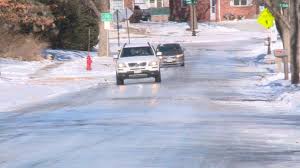Lincoln has been hit with an unusual amount of snow over the last two weeks. Last year, many Lincoln residents would have been stranded at home due to the lack of snow removal on side streets.
But the City of Lincoln announced in November that was partially reversing an 11 year-old city policy of not plowing side streets. The City announced a pilot program to remove snow on some side streets if accumulation topped four inches. The move comes after public outcry last winter about icy conditions in Lincoln’s residential neighborhoods.
Ice, snow, worker classification and slip and falls
Last winter, I blogged about how icy side streets were a workplace hazard for delivery drivers. In my view the risks to delivery drivers has increased since last winter as the COVID pandemic accelerated the rise of online shopping.
Icy streets and sidewalks also create additional legal risks as more delivery workers are misclassified as contractors rather than employees. Employees are covered by workers’ compensation for work injuries, contractors are not. Bluntly, Nebraska courts have tended to side with business in recent decisions about worker classification and workers compensation.
But even if a worker is legally barred from bringing a workers’ compensation claim for a slip and fall injury due to snow and ice, premises owners can be sued if their failure to reasonably remove snow and ice causes on injury. Property owners need to be diligent about removing snow and ice. A worker covered by workers’ compensation can bring a third-party claim if another party besides them or their employer is at fault for their injury.
Doing the right thing despite sovereign immunity
Private individuals and corporations can be sued for failing to remove snow, not so much with local governments. I am somewhat surprised the City of Lincoln changed course, because the City is basically immune from being sued for snow removal. The City is protected by sovereign immunity in general and a specific law immunizing local governments from liability for snow removal in particular. So why did the City of Lincoln, partially “walk back” a fairly long standing policy? I have a few ideas.
One icy side streets create a risk of injury for city employees like police and firefighters. Not only is there a risk of bodily injury, the City would also have to pay for damage to city vehicles. It may make financial sense for the city to plow side streets. Lincoln Mayor is Leirion Gaylor Baird is a Yale-educated, veteran of the elite consultancy McKinsey and Company. In short, she is a wonk. I take the City at their word that they engaging in what amounts to experiment.
But the City could also be responding to popular outcry about icy residential streets. Hey, we live in a little “d” democracy and governments are supposed to respond to popular pressure. I also think it could make sense from a dollars and sense perspective. But I do wonder if residential snow removal is sustainable from a budget standpoint. The City stopped doing residential snow removal in 2009. 2009 was during the so-called “Great Recession.” Lincoln is now suffering through the COVID-19 recession. So even if residential snow plowing could make sense financially and improve occupational safety, there may be pressure to cut the City budget in other places or to cut taxes to pay for additional services.
Lincoln is a prosperous city and I think the choice between clearing snow and ice from side streets and other city services is a false choice, but historically Lincoln city government has been reluctant to raise taxes to pay for additional city services


